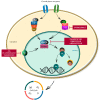Targeting Cell Cycle in Breast Cancer: CDK4/6 Inhibitors
- PMID: 32899866
- PMCID: PMC7554788
- DOI: 10.3390/ijms21186479
Targeting Cell Cycle in Breast Cancer: CDK4/6 Inhibitors
Abstract
Deregulation of cell cycle, via cyclin D/CDK/pRb pathway, is frequently observed in breast cancer lending support to the development of drugs targeting the cell cycle control machinery, like the inhibitors of the cycline-dependent kinases (CDK) 4 and 6. Up to now, three CDK4/6 inhibitors have been approved by FDA for the treatment of hormone receptor-positive (HR+), HER2-negative metastatic breast cancer. These agents have been effective in improving the clinical outcomes, but the development of intrinsic or acquired resistance can limit the efficacy of these treatments. Clinical and translational research is now focused on investigation of the mechanism of sensitivity/resistance to CDK4/6 inhibition and novel therapeutic strategies aimed to improve clinical outcomes. This review summarizes the available knowledge regarding CDK4/6 inhibitor, the discovery of new biomarkers of response, and the biological rationale for new combination strategies of treatment.
Keywords: CDK4/6 inhibitors; cancer; cell cycle; cyclin-dependent kinase; hormone receptors; hormone therapy; metastatic breast cancer; therapies.
Conflict of interest statement
The authors declare no conflict of interest.
Figures

References
Publication types
MeSH terms
Substances
LinkOut - more resources
Full Text Sources
Other Literature Sources
Research Materials
Miscellaneous

